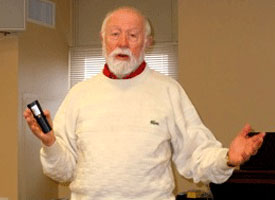By Roland Lovstad
Craig Pankow refuses to accept the notion that his small-town congregation in North Dakota will close for lack of members. In fact, he wants to encourage other rural and small-town churches to visualize outreach as a viable option.
“Rural and Small Town Mission has given Pastor Dean Hartley and me the opportunity to not accept the thought that we’re just going to survive until our doors eventually close,” says Pankow. “There are alternatives.”
Pankow is a member of St. John Lutheran Church, Underwood, one of three congregations that have formed a partnership along Highway 200 in central North Dakota. The other “Highway 200
On July 22-23, the partnership will host a “Rural Plunge,” inviting representatives from other rural and small-town congregations to hear about the Highway 200 partnership, to share ideas and to encourage one another. The plan is for visitors to stay in members’ homes, meet in the partner churches and discover first-hand how partnerships can build a vision for mission.
During the “Rural Plunge,” Dr. Eugene Bunkowske, the Fiechtner Chair professor of Christian outreach at the Hoffmann Institute connected with Concordia University, St. Paul, Minn., will lead Bible studies. Dr. Ralph Geisler will explain the rural mission resources available through a collaborative partnership between the Saint Paul’s Institute for Education (SPIFE) at Saint Paul’s Lutheran High School in Concordia, Mo. and LCMS World Mission’s Rural and Small Town Mission. Geisler is missionary/catalyst for rural and small-town churches, with SPIFE.
“We cannot only support each other in ministry to our inactive members, but according to census and demographic studies, 50 percent of the people in this 60-mile stretch along Highway 200 say they have no church affiliation,” Pankow states. “We’re hoping — and believing — we can reach out to those people and show them Christ.”
Rev. Dean Hartley, who serves the ministry partnership, was called in 2001 to St. John, Underwood, and Trinity, Hazen. During that time, he also served two vacancies at St. John, McClusky. After six months in the most recent vacancy, he asked if the congregation wanted to form a regional partnership.
“I had the brainchild of forming a regional partnership because, when I first came here, someone said St. John, Underwood, and Trinity were two separate congregations sharing a pastor,” Hartley explained. “Each keeps its individuality, but in working together we’re stronger in numbers. We can share what we have done and what has worked or hasn’t worked — that’s my vision for this partnership.”
The congregations hold separate worship services, but have combined worship services when a month has five Sundays. They also plan to worship together on Ash Wednesday.
Pankow and Hartley were among a dozen participants in a Rural Regional Mission Partnership Retreat Jan. 20-22 at the Rural & Small Town Mission — Saint Paul’s Institute for Education (RSTM-SPIFE) in Concordia, Mo. Similar retreats are scheduled for April 8-9 at Mission Central in Mapleton, Iowa, and April 15-16 in Callaway, Minn., plus more to be announced.
Bunkowske, who spoke at the retreat and will lead Bible studies at the “Rural Plunge,” said rural and small-town communities have und
Drawing from his experience as a missionary in Africa and as a college and seminary professor to develop his Bible studies, Bunkowske challenges participants to look for dynamic change. As participants look for dynamic change in the people of the Bible, he asks them to apply the changes to themselves and their congregations. He also challenges participants to write their own studies.
“It’s not just information transfer,” he explains. “Ideas from the Scripture are very important, but it can’t be only that. It has to be a spirit-inspired dynamic change that we look for in the studies. We look at the Scriptures and we see how the Holy Spirit performed change there and how He will — and does — perform change for and in us.”
Bunkowske builds the dynamic change concept using his Onion Diagram of Culture, which peels away layers of behaviors in an effort to determine key values of people in a community. He said the “onion” analysis has two effects: “First it’s to help people become conscious and intentional about their need to work at beliefs, worldview and ultimate allegiance. Then, as they are spiritually changed, we can expect transformation on the outer side.”
The Rural and Small Town Mission retreats, the “Rural Plunge” and other rural-ministry resources are coordinated by Geisler, who has served as the staff for the collaboration between RSTM — SPIFE, the Hoffmann Institute and LCMS World Mission.
“Wherever there are congregations and districts that are open and interested in ways they can be reaching their communities through multiple locations — that’s the kind of focus we’re taking,” Geisler said. He added that RSTM — SPIFE seeks to be a center for resources and information. “Our simple goal is to encourage rural and small-town congregations to serve as mission outposts in their community and in the world.”
Information about the “Rural Plunge” and Rural Regional Mission Partnership Retreats, as well as general resource information for rural and small-town ministry, is available from www.spife.org.
Roland Lovstad is a freelance writer and member of Immanuel Lutheran Church, Perryville, Mo.
Posted March 9, 2011
